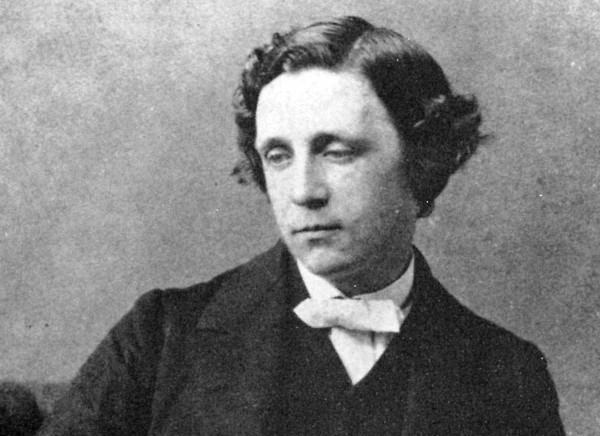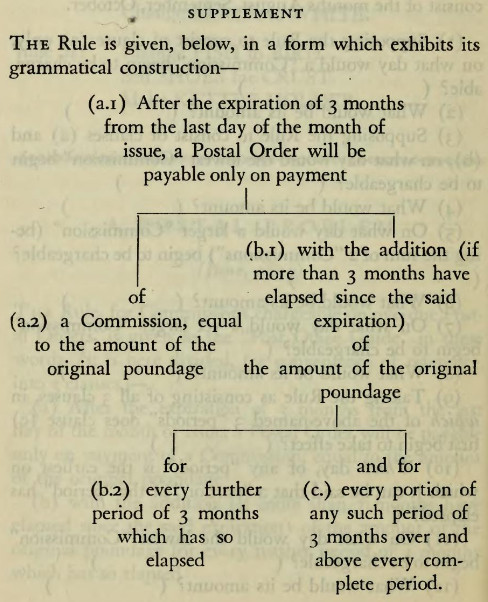
Browsing the Post Office Guide in June 1891, Lewis Carroll discovered an ambiguity that produces “a very curious verbal puzzle” — he sent this pamphlet to friends and interested parties:
The Rule, for Commissions chargeable on overdue Postal Orders, is given in the ‘Post Office Guide’ in these words, (it is here divided, for convenience of reference, into 3 clauses)—
(a) After the expiration of 3 months from the last day of the month of issue, a Postal Order will be payable only on payment of a Commission, equal to the amount of the original poundage;
(b) with the addition (if more than 3 months have elapsed since the said expiration) of the amount of the original poundage for every further period of 3 months which has so elapsed;
(c) and for every portion of any such period of 3 months over and above every complete period.
You are requested to answer the following questions, in reference to a Postal Order for 10/- (on which the ‘original poundage’ would be 1d.) issued during the month of January, so that the 1st ‘period’ would consist of the months February, March, April; the 2nd would consist of the months May, June, July; and the 3rd would consist of the months August, September, October.
(1) Supposing the Rule to consist of clause (a) only, on what day would a ‘Commission’ begin to be chargeable?
(2) What would be its amount?
(3) Supposing the Rule to consist of clauses (a) and (b), on what day would the lowest ‘Commission’ begin to be chargeable?
(4) What would be its amount?
(5) On what day would a larger ‘Commission’ (being the sum of 2 ‘Commissions’) begin to be chargeable?
(6) What would be its amount?
(7) On what day would a yet larger ‘Commission’ begin to be chargeable?
(8) What would be its amount?
(9) Taking the Rule as consisting of all 3 clauses, in which of the above-named 3 ‘periods’ does clause (c) first begin to take effect?
(10) Which day, of any ‘period,’ is the earliest on which it can be said that a ‘portion’ of the ‘period’ has elapsed?
(11) On what day would the lowest ‘Commission’ begin to be chargeable?
(12) What would be its amount?
(13) On what day would a larger ‘Commission’ begin to be chargeable?
(14) What would be its amount?
(15) On what day would a yet larger ‘Commission’ begin to be chargeable?
(16) What would be its amount?
Signature:
Date:
He followed up with this supplement later that month:

The trouble, as I read it, is that clause (c) is ambiguous. Presumably the postal authorities intended the general rule to be that a patron had three months to redeem a postal order, and beyond this would be charged a commission (here, 1 penny) for every three months that had elapsed since the deadline — including the last such period, which would not be prorated. Unfortunately, the phrase “every complete period” means exactly that — it refers to every completed period on the calendar. This sets the clock going twice as fast as intended. Our patron should owe 1d on May 1, 2d on August 1, and 3d on November 1. But with clause (c) worded as it is, she’ll owe 1d on May 1, 4d on August 1, and 6d on November 1. The final effect is that, beyond the first period, postal patrons who follow these rules will pay twice the intended commission.
I don’t know whether the post office ever learned about this. I imagine most patrons trusted them to do the math, and no one but Carroll recognized the ambiguity.
